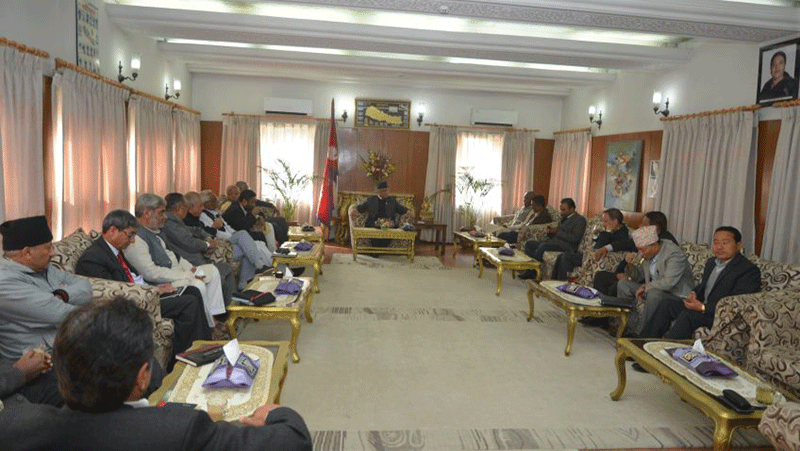Four-party meeting ends inconclusively
Kathmandu, May 27
A four-party meeting held at Prime Minister Pushpa Kamal Dahal’s official residence in Baluwatar to forge consensus on the agitating forces demands ended inconclusively today.
Top leaders of the Nepali Congress, the CPN-Maoist Centre, the CPN-UML and the Rastriya Janata Party Nepal attended the meeting.
RJPN leader Rajendra Mahato said they told the big three parties that they would participate in the second phase of elections only when the constitution amendment bill was passed and their other demands were met. The RJPN has demanded that false charges slapped against the cadres of the agitating forces be withdrawn, the families of those who lost their loved ones and their properties during Tharuhat and Madhes movement be compensated and the RJPN be given election symbol.
“The meeting ended inconclusively. They said they would consult within their respective parties about our issues,” Mahato said.
CPN-UML Deputy Parliamentary Party leader Subas Chandra Nembang said the prime minister told the RJPN leaders at the end of the meeting that meeting two demands — passing the constitution amendment bill and increasing the number of local levels in Madhes would not be possible before the second phase of local polls. He said the leaders also held collective, bilateral and trilateral meetings.
Earlier, NC leaders had held separate meeting with the RJPN leaders.
RJPN leader Rajkishor Yadav told THT that the NC leaders told them that they could seek to delay second phase of local polls by eight to ten days if they agreed to participate in the polls. The RJPN leaders also told the NC leaders that the second phase polls should be held only after Ramadan festival.
Yadav said they told the NC leaders that they were not only concerned about election symbol, but they also wanted to know from them when they wanted to address their issues.
NC President Deuba blamed the main opposition CPN-UML for thwarting ruling parties’ attempt to ensure passage of the constitution amendment bill. “If you think UML is the main spoiler, then postpone the second phase of polls. The UML would be forced to address our demands,” Yadav quoted RJPN leaders telling NC President Sher Bahadur Deuba.
Yadav said the NC President cited the Supreme Court’s stay order against the government’s decision to increase 22 local levels in Madhes to which the RJPN leaders told him that they could not leave their agenda just because of the SC decision.
Mahato said he told Deuba during the RJPN-NC meeting that the ruling parties had been saying that the constitution amendment bill could not be passed as the ruling parties lacked two-thirds majority, but the government had not done things that it could do on its own such as withdrawing charges against cadres of the agitating forces, providing compensation to the victims and increasing the number of local levels and granting election symbol to his party.
He said the RJPN told the NC president if their demands were not met, they would not participate in the second phase of elections and would not let the government hold elections in Madhes.
Nepali Congress leader Gopal Man Shrestha, who was present in the meeting, said the NC president assured that they would put the constitution amendment bill to vote when they have the support of two-thirds majority in the House. “We failed to pass the bill last time due to sudden disappearance of 10 Rastriya Prajatantra Party lawmakers. We will continue to try our best to pass the bill,” Shrestha said.
According Shrestha, NC President Deuba told RJPN leaders that since the second phase of elections were going to be held soon, it might not be possible to look for alternative ways to increase the number of local polls in Madhes. The NC president was positive about granting election symbol to RJPN about which a decision could be taken after consulting other parties, including the main opposition CPN-UML as well as the Election Commission. Deuba also assured that the cases of those who were falsely indicted would be withdrawn and those who lost their properties would be compensated.






